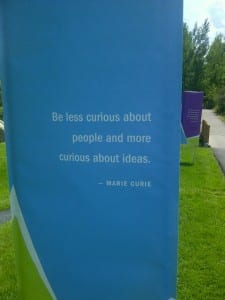 At the grand opening of the Aspen Ideas Festival, some of the most noteworthy speakers flew through two-minute presentations on their vision of the next big thing. Hearing large-scale concepts effortlessly shortened into two-minutes made TED’s 18-minute presentation time seem long-winded.
At the grand opening of the Aspen Ideas Festival, some of the most noteworthy speakers flew through two-minute presentations on their vision of the next big thing. Hearing large-scale concepts effortlessly shortened into two-minutes made TED’s 18-minute presentation time seem long-winded.
And what two-minute idea caught me by surprise? A direct endorsement of Ketchum’s idea construct systems. Matt Thompson, NPR wunderkind and editorial product manager, offered a brief history of small ideas bequeathing bigger ideas, or as he eloquently phrased it, “Little ideas shacking up to create larger visionary ideas.”
Thompson’s two-minute presentation called “What’s the Big Idea?” walked us through the evolution of TV shows to explain how story narratives (ideas) evolved as technology was able to better organize ideas. An old TV episode could only be seen when it aired. Think I Love Lucy. Since many viewers may not have seen last week’s episode, the show had to follow a simple, standard formula. Now, think The Wire. We’re able to record, replay, and save the entire series from home. The ideas have evolved because the idea space is more accessible and organized.
Twitter may serve as our current RSS feed or idea organizer and devices like Storify and Tumblr enable mass, incessant sharing of content, but where is the structure? These offerings are fleeting, just like a trending Twitter hashtag; they don’t offer any long-term binding agents to connect concepts together. There is no doubt that we are being inventive, but there is no structured space for inventions to evolve to their full potential. We need a TiVo for Ideas.
Another two-minute idea I loved came from PepsiCo Global Beverage head, Brad Jakeman. Brad reinforced the importance of following the niche tailwind ideas of the last ten years, recognizing that they could turn into the major headwinds of the next ten years. He was quick to recall that two unknown guys from Finland created Angry Birds and are now globally known for revolutionizing video games. In the presence of enormous multi-national corporations, good ideas level the playing field.
P.J. O’Rourke from The Atlantic (organizer of Aspen Ideas Festival) wrote an article called “Let’s Cool It With Big Ideas.” O’Rourke loves small ideas like Graham Bell’s telephone and fears big ideas like the atomic bomb and communism. Whether we share his fear or not, we can all agree with him on one thing: “we still don’t know which ideas will have which result.”
So is small the new big? I don’t think so. That would be an unbalanced view. The best we can do on a company-wide level is to provide homes for our thoughts and the structure for ideas to rub against each other, spark new flames, and evolve into unexpected outputs. At Ketchum, we house idea generation online using constructs like ide8 and Mindfire, which allow for focused idea sharing across our network. We even crowdsource ideas from the brightest university students globally. What we are looking for in all of this is the best context to generate concepts—the best environment for ideas to evolve. Whatever this perfect idea space is, I imagine it’s on-point, efficient, and a little unpredictable…just like TiVo.
Photo credit: @Aspen Twitter handle here: http://twitter.com/aifestival/status/219824610995224577/photo/1



